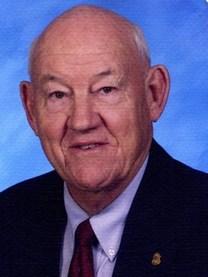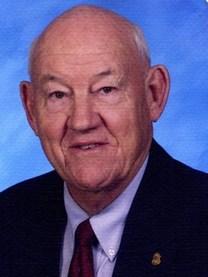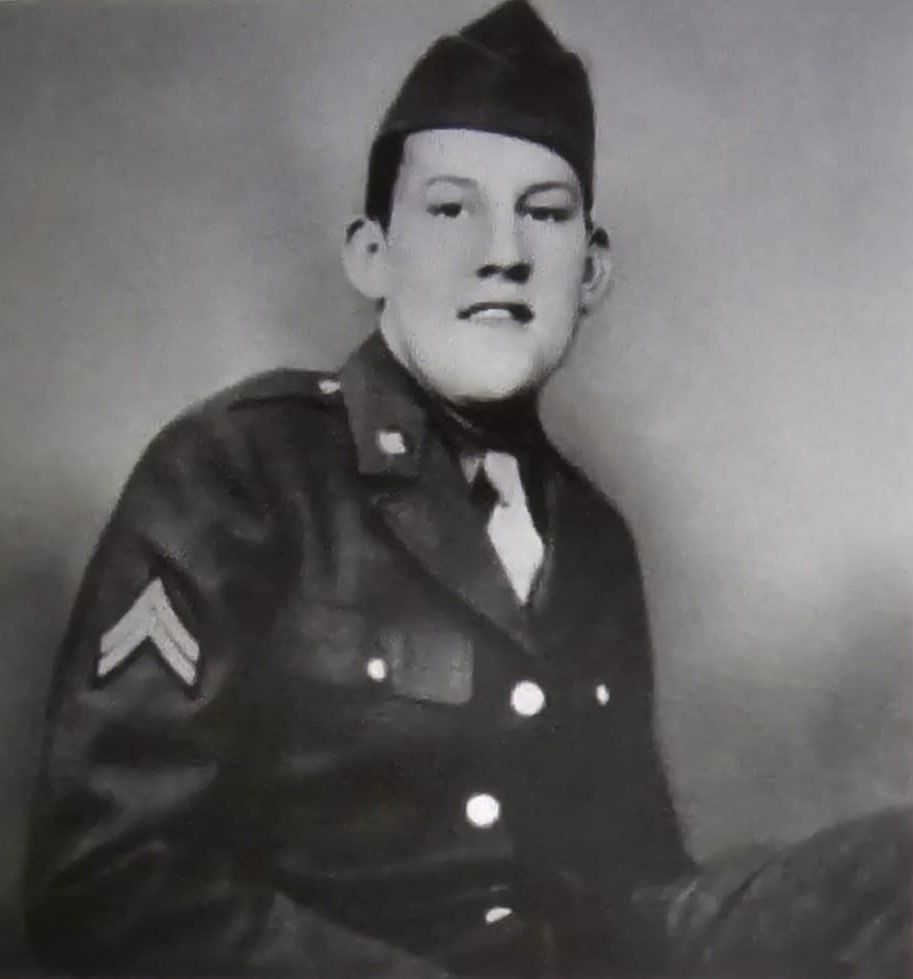Bill was only 8 when his father died in a car accident, leaving his 38 year old mother a widow with 5 children. These were Depression years and the insurance money was meager. The 3 Bennett boys had paper routes, and they worked the weekends and summers to supplement the family resources. Jobs prevented Bill from participating in many extra-curricular activities in high school, but he did enjoy acting in the plays.
Bill was drafted in February, 1943, assigned to the Medical Training Regiment and served in Burma until his discharge in 1945. Bill wrote a very interesting account of his early life and his years in the Army entitled, World War II Combat Medic. You may borrow a copy from the church library.
The GI Bill made it possible for returning war veterans to attend college. He attended Morningside College in Sioux City, IA, completing his BS degree in 1950. Anna Backes was the local librarian in Sioux City and they were married in 1947. Son Jeff was born in 1954.
Bill worked in circulation for the local newspaper for a couple of years and then at Westinghouse as a sales representative. He applied for a position as a Special Agent for the FBI, and received an appointment in 1955. His first assignment was in Little Rock, Arkansas. He was assigned to criminal work, Federal violations, kidnapping, bank robberies, interstate crime and Civil Rights violations. He was present during the confrontations that accompanied the integration of Little Rock High School.
Much investigative work in Little Rock was helping the Department of Justice lawyers working on voter registration, school board irregularities, cross burnings and other Civil Rights violations.
On January 1, 1957, the FBI transferred Bill to the Chicago office, where he spent ten years. He specialized in violations involving transportation - railroads, airlines and trucking companies. This included airplane disasters, hijacking and crime aboard aircraft. He was in charge of liaison with the airlines at Chicago Midway and later at O'Hare International, when it opened. He was also a police instructor and taught classes in investigative procedures and sex crime investigations for law enforcement agencies in Illinois and at the North Western University in Evanston.
In July 1967, Bill was transferred to the Los Angeles office, where he continued to work criminal matters. He became a Supervisory Special Agent, heading a criminal squad and was in charge of the Los Angeles Airport contigent and liaison with all the airlines, working as he had in Chicago.
One of the cases of importance was the assassination of Robert Kennedy. The LA office was two blocks from the Ambassador Hotel. Bill was on duty that night, assisting Secret Service and the LAPD. He was present at Good Samaritan Hospital when Kennedy was declared dead. His team prepared the report that was used to help convict Sirhan Sirhan.
Another important case was Patty Hearst and the Symbionese Liberation Army (SLA). Bill went to the sporting goods store near the airport where Hearst and the group had botched a robbery. Bill was the ranking agent at the big shoot-out on the South side when the home went up in flames and members of the SLA perished. Patty Hearst and several others were not present at the time, but were at a drive-in movie nearby. It took three days to gather up the shell casings and draw up the crime scene after the debacle.
Martin Luther King, Jr. was assassinated by James Earl Ray, who had once resided in Los Angeles and was now a fugitive. Bill's team conducted the investigation of where Ray worked and lived and developed information that helped locate him. He fled to Canada, then England and was finally apprehended in Europe, as a result of FBI and Interpol investigations.
When Bill retired the FBI, at their mandatory retirement age of 55, he became Director of Investigation and Corporate Security for the Pacific Enterprises, which included Thrifty Drug Stores, Big 5 Sporting Goods and later the Gas Company. Once again he faced the mandatory retirement age at 65 and finally settled into the life without time clocks.
******
Do not stand at my grave and weep...
I am not there. I do not sleep.
I am a thousand winds that blow,
I am the diamond glints on snow.
I am the sunlight on ripened grain,
I am the gentle autumn rain.
When you awake in the morning's hush
I am the swift uplifting rush
Of quiet birds in circled flight.
I am the soft star-shine at night.
Do not stand at my grave and cry...
I am not there... I did not die.
Bill was only 8 when his father died in a car accident, leaving his 38 year old mother a widow with 5 children. These were Depression years and the insurance money was meager. The 3 Bennett boys had paper routes, and they worked the weekends and summers to supplement the family resources. Jobs prevented Bill from participating in many extra-curricular activities in high school, but he did enjoy acting in the plays.
Bill was drafted in February, 1943, assigned to the Medical Training Regiment and served in Burma until his discharge in 1945. Bill wrote a very interesting account of his early life and his years in the Army entitled, World War II Combat Medic. You may borrow a copy from the church library.
The GI Bill made it possible for returning war veterans to attend college. He attended Morningside College in Sioux City, IA, completing his BS degree in 1950. Anna Backes was the local librarian in Sioux City and they were married in 1947. Son Jeff was born in 1954.
Bill worked in circulation for the local newspaper for a couple of years and then at Westinghouse as a sales representative. He applied for a position as a Special Agent for the FBI, and received an appointment in 1955. His first assignment was in Little Rock, Arkansas. He was assigned to criminal work, Federal violations, kidnapping, bank robberies, interstate crime and Civil Rights violations. He was present during the confrontations that accompanied the integration of Little Rock High School.
Much investigative work in Little Rock was helping the Department of Justice lawyers working on voter registration, school board irregularities, cross burnings and other Civil Rights violations.
On January 1, 1957, the FBI transferred Bill to the Chicago office, where he spent ten years. He specialized in violations involving transportation - railroads, airlines and trucking companies. This included airplane disasters, hijacking and crime aboard aircraft. He was in charge of liaison with the airlines at Chicago Midway and later at O'Hare International, when it opened. He was also a police instructor and taught classes in investigative procedures and sex crime investigations for law enforcement agencies in Illinois and at the North Western University in Evanston.
In July 1967, Bill was transferred to the Los Angeles office, where he continued to work criminal matters. He became a Supervisory Special Agent, heading a criminal squad and was in charge of the Los Angeles Airport contigent and liaison with all the airlines, working as he had in Chicago.
One of the cases of importance was the assassination of Robert Kennedy. The LA office was two blocks from the Ambassador Hotel. Bill was on duty that night, assisting Secret Service and the LAPD. He was present at Good Samaritan Hospital when Kennedy was declared dead. His team prepared the report that was used to help convict Sirhan Sirhan.
Another important case was Patty Hearst and the Symbionese Liberation Army (SLA). Bill went to the sporting goods store near the airport where Hearst and the group had botched a robbery. Bill was the ranking agent at the big shoot-out on the South side when the home went up in flames and members of the SLA perished. Patty Hearst and several others were not present at the time, but were at a drive-in movie nearby. It took three days to gather up the shell casings and draw up the crime scene after the debacle.
Martin Luther King, Jr. was assassinated by James Earl Ray, who had once resided in Los Angeles and was now a fugitive. Bill's team conducted the investigation of where Ray worked and lived and developed information that helped locate him. He fled to Canada, then England and was finally apprehended in Europe, as a result of FBI and Interpol investigations.
When Bill retired the FBI, at their mandatory retirement age of 55, he became Director of Investigation and Corporate Security for the Pacific Enterprises, which included Thrifty Drug Stores, Big 5 Sporting Goods and later the Gas Company. Once again he faced the mandatory retirement age at 65 and finally settled into the life without time clocks.
******
Do not stand at my grave and weep...
I am not there. I do not sleep.
I am a thousand winds that blow,
I am the diamond glints on snow.
I am the sunlight on ripened grain,
I am the gentle autumn rain.
When you awake in the morning's hush
I am the swift uplifting rush
Of quiet birds in circled flight.
I am the soft star-shine at night.
Do not stand at my grave and cry...
I am not there... I did not die.
Family Members
Sponsored by Ancestry
Advertisement
Explore more
Sponsored by Ancestry
Advertisement









